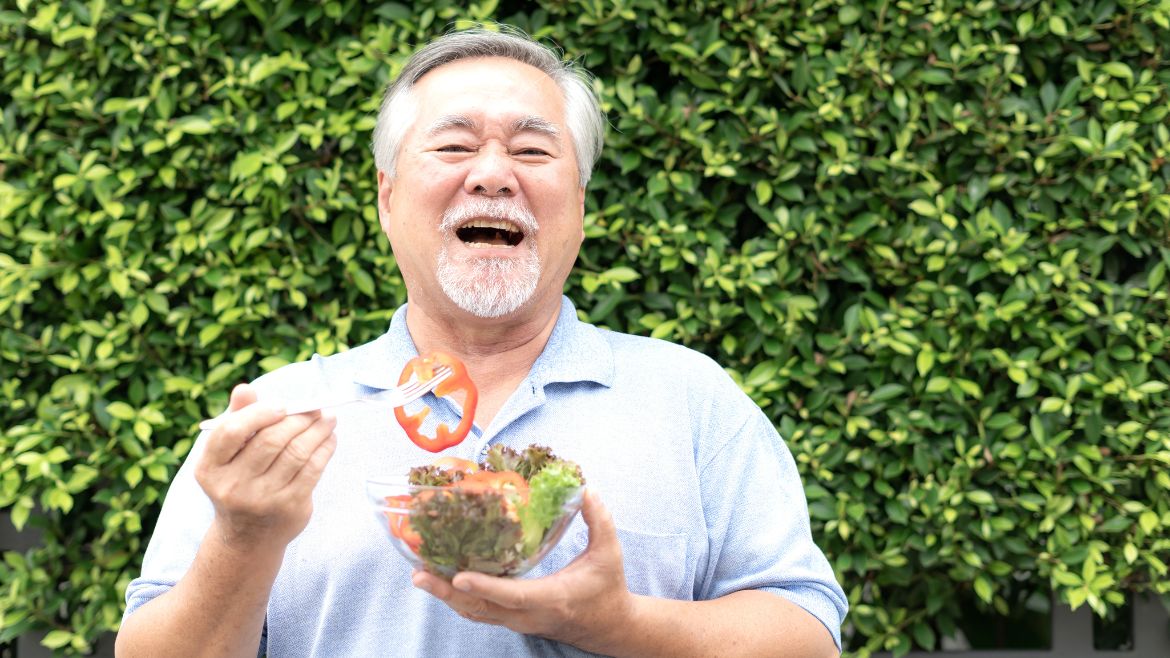It’s common for appetites to change as people become older. Metabolisms slow and levels of exercise decrease. Often times proper nutrition levels deteriorate due to meals being ignored or bad food choices made.
According to Karen Hunley, director of Dietary Services at American Senior Communities, poor nutrition can cause unintended weight loss and compromise the immune system, making an elderly person more vulnerable to illnesses like the common cold or even the flu.
Here are some good nutrition tips for seniors
Eat a variety of foods to get all the nutrients needed. Eat a variety of foods from the five food groups, including lots of colorful vegetables. To lower your risk of developing conditions like high blood pressure, diabetes, and heart disease, pick foods with low to no sodium, saturated fats, or added sugar.
Drink plenty of water. Purchase a reusable water bottle with a straw and put room temperature water in it. It’s easier for your loved one to drink enough water when it is right in front of them. You’’ be shocked at how much more water is consumed and it is often easier for seniors to use a straw.
Keep ‘extras’ or ‘sometimes foods’ to a minimum. Doughnuts and french fries are simple and quick snacks that may soothe your appetite, but they lack essential nutrients. It is far more difficult to burn excess calories as people become older as many seniors naturally become less active. A nutritious diet is a good idea at any age, but it becomes even more crucial as we age.
Maintain healthy weight and muscle strength through physical activity. Senior citizens should get up and move more frequently during the day. The more physical exercise you engage in, the more benefits there will be for your health. Even a 20 minute walk around the block or through the grocery store or is preferable to no activity at all.
Here are some tips for making good nutrition easier
Taking care of your nutrition does not need to be complicated. To ensure your loved ones are are meeting specific dietary needs, consult their doctor before following these tips.
Have more meal times. A simple solution for a lack of appetite and slow digestion is to eat more frequently and in smaller portions. Making healthy snacks readily available throughout the day might help with this. It’s interesting to note that healthy snacking throughout the day increases metabolism, so nibble away!
Spice up your food. Avoid adding salt to enhance the flavor of your meal if at all possible; instead, feel free to season your favorite dishes with low sodium herbs and spices, or both. Finally, adding colorful, fresh fruits and vegetables to your plate and to specific meals will help. Food can become more palatable and more appealing to the eye.
Help with Nutrition at Senior Living Communities
Proper control to eat healthy and regularly is essential if your aging parent is to live independently. A healthy and sufficient diet is the first requirement for having a happy later life, just as breakfast is the most important meal of the day.
If your parent or loved one is no longer able to cook or prepare meals that are nutritious and healthy, it may be time to consider a care community for them. All meals are prepared for them so you have one less thing to worry about. Numerous health advantages result from having an interdisciplinary team monitor meals and eating habits leaving you with extra time to take pleasure in visits and time with your loved one.
Elderly people’s nutritional requirements change as they age, among other things. To stay strong, alert, and energized, learn how to overcome the challenge and fulfill changing nutritional requirements. At Ayers Health and Rehabilitation Center, Trenton, Florida, we have registered dietitions that provide customized recommendations and interventions based on current evidence-based practices. Get in touch with us!

